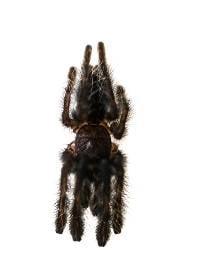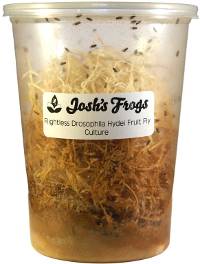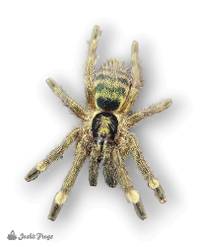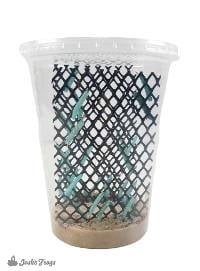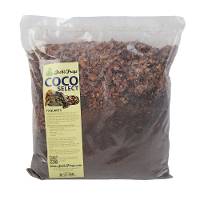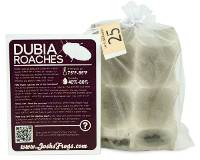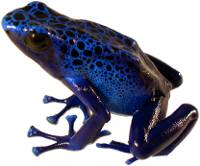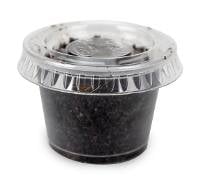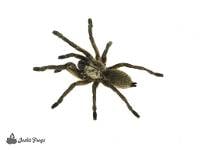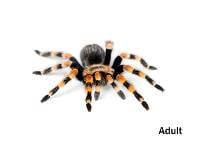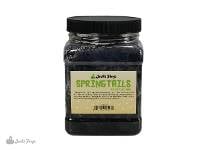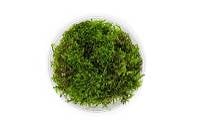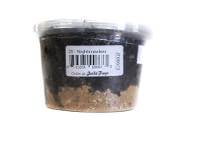Josh's Frogs
Indian Ornamental Tarantula - Poecilotheria regalis (Captive Bred)
Indian Ornamental Tarantula - Poecilotheria regalis (Captive Bred)
$64.99 0.0 out of 5 stars
(0)
0.0 out of 5 stars
(0)About This Product
SPECIAL NOTE: USPS forbids shipping venomous spiders or scorpions in the mail.
Because of this, we ship these animals FedEx priority overnight for a flat fee of $39.99.
* This species has medically significant venom, bites can require medical attention! *
Defining Characteristics:
- One of the most popular members of its genus, the Indian Ornamental is well loved by keepers with a bit of experience with Old World tarantulas.
- This species is a lightning quick arboreal with what’s considered a medically significant bite, this species is not for the beginner keeper and should not be handled.
- This species is fairly photosensitive and as such will usually opt to hide during the day, and can most often be found in the open stretching its legs after dark.
Name: Poecilotheria regalis has Greek and Latin roots meaning “Kingly or Regal colored beast” with its impressive stature and patterning and its canary yellow leg bands it’s easy to see how that name came to be. Commonly it is usually known as the Indian Ornamental Tarantula, though sometimes you will see them referred to as simply the Indian Ornamental Tree Spider.
Recommended Enclosure Size: The Indian Ornamental is an arboreal species, meaning the enclosure should be taller than it is long. The recommended enclosure height is at least 3x the spider’s diagonal leg span, and the other dimensions should not be less than two times the spider’s diagonal leg span. This species does best in an enclosure with ample cross ventilation.
Temperature (°F): This species thrives in the mid 70’s to low 80’s, so a temperature range of 74-80 degrees is ideal, though no issues have come from keeping them at general room temperature of 72°. Temperatures regularly dipping below 65 or spiking above 85 degrees should be avoided.
Humidity: These spiders thrive in a humid environment, thriving in ambient humidity between 75% and 85%. This can be achieved by making sure the substrate is always at least lightly moistened, the enclosure sides and décor should be spritzed at least lightly around 2x a week to provide your spiderling droplets to drink from. A small water dish such as a water bottle ink cap, tattoo ink cup or something of similar size can be provided for spiderlings.
Size: Babies of this species are at least 1 inch at time of sale. Mature adults can reach up to an 8 inch diagonal legspan with males maturing at very varying sizes, as little as 5 inch diagonal leg span or as much as 7.5 inches.
Age: At time of sale Indian Ornamental spiderlings sold by Josh’s Frogs are at least 2-3 months old. Females of this species can get up to 12 years of age, with males averaging about one third of that lifespan.
Feeding: At time of sale Indian Ornamentals sold by Josh’s Frogs are eating hydei fruit flies, as the spider molts and grows, so should the prey items, with the goal size of feeder insects being the size of the spider’s carapace or smaller. Spiderlings should be fed every 4-7 days, adults every 7-10. To prevent injury, never offer food to a tarantula less than a week after its most recent molt.
Sexing: Due to age, Indian Ornamental spiderlings sold by Josh’s Frogs are sold as unsexed. Specimens of 2.5-3 inches will be able to start being accurately sexed. The most accurate method will always be molt sexing. The molt of a female tarantula, between the top set of book lungs will have a slit with spermatheca and a uterus externus, which on a smaller spider will just be a flap that moves when manipulated with a toothpick or a pin. A male tarantula will have a much more plain slit that will not budge with attempts to manipulate it. This species can be sexually dimorphic in patterning, but that is not an entirely reliable way to sex them as natural variations can make a male’s pattern look feminine and vice versa.
Color/Pattern: young spiderlings are largely grayscale in color, with some start to their adult patterning even as babies. As they grow and molt their colors will change to have more contrast, with their top side being primarily light gray/beige with black patterning. Ventrally more mature spiders will have black and yellow banding on the underside of its legs, the majority of its underside will be dark gray/black with a gray/beige stripe across the book lungs mid abdomen.
Social Behavior: While some short term success has been reported housing Poecilotheria in communal setups, reports usually conclude that as they age they do tend to become cannibalistic. It is for this reason that we recommend that these spiders be housed solitarily.
Breeding: Males and females of sexual maturity can be put in the same enclosure briefly for the purpose of mating. Ideally both will be fairly freshly molted and well fed. The male and female should be separated fairly immediately after insertion is observed (the male will generally initiate separation on his own after he has had success) or if the spiders are acting less than receptive or aggressive towards each other.
Natural Range: In the wild they can be found in forests over much of India’s Eastern coast, particularly around Andhra Pradesh and the Nallamala Hills and Forest Regions.
Shipping
After placing an order containing a live animal, you will receive a scheduling email containing our JotForm scheduling link to schedule your new pet's delivery date.
With this scheduling link, you will be able to schedule your order's delivery up to 30 days in advance. You will be able to choose a date of delivery for Tuesday-Saturday (Saturday arrival depends on the carrier's service availability) with the estimated time of arrival generally being 12pm, or 4:30pm for more rural areas. Overnight lows must be above 40°F to ship directly to you (or above 30°F for FedEx Ship Center pickups) as well as below 90°F by estimated time of arrival.
If you require further assistance, or prefer to talk to one of our Customer Service agents, please feel free to reach out to our [email protected] email or our phone line 1-800-691-8178.
Other Customers Also Bought
Customer Reviews
0.0 out of 5 stars
Review data
5 star reviews
- 0%
4 star reviews
- 0%
3 star reviews
- 0%
2 star reviews
- 0%
1 star reviews
- 0%

